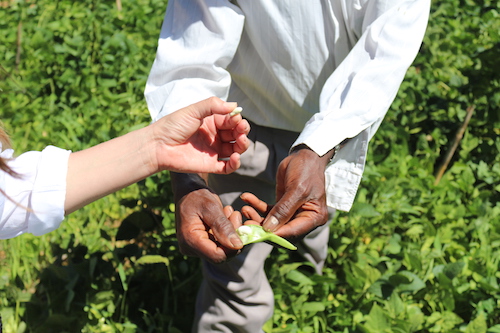Research supporting Mildura’s ‘hidden farmers’
The Sunraysia Burundian Garden in regional Victoria has evolved out of research conducted by human geography academics from the University of Melbourne and University of Wollongong and was launched with a ribbon-cutting ceremony on 19 September 2016.

Image: Ananth Gopal
Members of the Twitezimbere Burundian Community in Mildura with a background in farming and business, will now establish food growing plots on land offered for their use by a local family-owned business, Sunraysia Produce. They will grow traditional foods, such as maize and beans, which are important for them culturally, for their health, and for sharing among the community. This process is being facilitated by Sunraysia Local Food Future leader, Deborah Bogenhuber, with the support of Slow Food Mildura.
Professor Lesley Head and Dr Olivia Dun from the School of Geography, University of Melbourne and Dr Natascha Klocker (School of Geography and Sustainable Communities, University of Wollongong) have been conducting research under the ARC Discovery Project “Exploring culturally diverse perspectives on Australian environments and environmentalism” since late 2014. They are interested in how people from different ethnic backgrounds see the landscape in Australia, and how knowledge and skills developed in their countries of origin translate in the Australian context. The research project set out to look at the environmental knowledge of culturally and linguistically diverse groups in the Sunraysia Region (straddling the Murray River in south-west NSW and north-west Victoria) given it is one of the most ethnically diverse rural areas of Australia. As a horticultural region, the focus of the research in the Sunraysia quickly turned to looking at migrants and refugees’ food growing skills. Through this process the researchers realised there are ‘hidden farmers’ in Australia; many newer migrants and refugees were farmers in their countries of origin and some even ran relatively large-scale farming businesses. The skills of these farmers have largely remained hidden post-migration because they do not have the capital to purchase land in the Sunraysia.
These research findings were presented at the ‘Diverse people, diverse crops’ workshop for government and community representatives in Mildura, Victoria during May 2016 at the premises of Sunraysia Mallee Ethnic Communities Council and co-hosted by Mildura Development Corporation. As a result, a connection was made with Sunraysia Local Food Future who have since been working to facilitate the establishment of the Burundian community garden as a pilot demonstration of the Food Next Door project. The academics are pleased that Sunraysia Mallee Ethnic Communities Council, Sunraysia Produce and Sunraysia Local Food Future have come together to help make this happen and will continue to document this process as it evolves.
By Olivia Dun, Natascha Klocker and Lesley Head.